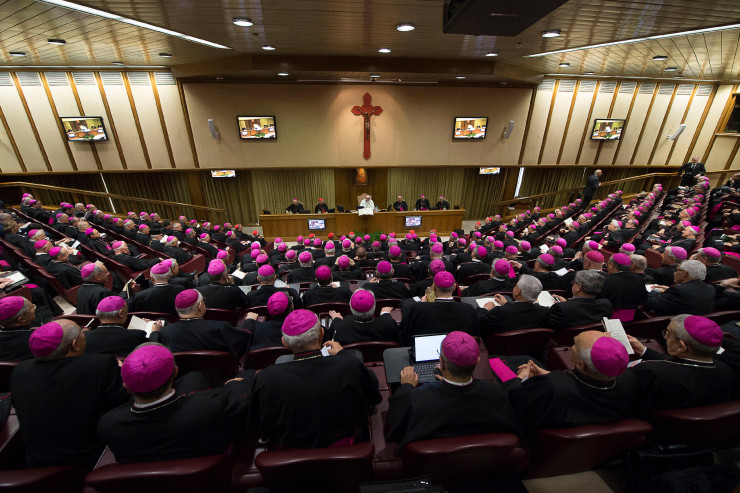The Church of tomorrow is synodal and collegial
In the lives of many laity, especially the post-Vatican II generation, the Aposotolic Exhortation Amoris Laetitia (The Joy of Love) could be the most
Jul 22, 2016

By Massimo Faggioli
In the lives of many laity, especially the post-Vatican II generation, the Aposotolic Exhortation Amoris Laetitia (The Joy of Love) could be the most consequential document since the 1968 Humanae Vitae (human Life) of Pope Paul VI.
The reception of Humanae Vitae was traumatic — for the Pope (who in the remaining ten years of his pontificate did not publish another encyclical). It was the same — traumatic for the vast majority of Catholics and for the bishops.
However, the ethos of collegiality was alive for the bishops. Despite the negative reading of Humanae Vitae, expectations for the newly created Bishops’ Synod were still high. Typically, national episcopates sought to secure the authority of the papal teaching while simultaneously maintaining credibility with their local churches by coming out with collective statements on the encyclical. It wasn’t just theologians, but bishops’ conferences too did the same. And this was the case in several European countries, as well as the United States and Canada.
But nothing like that happened for the reception of Amoris Laetitia.
Strange as it may sound, there was more synodal collegiality during the reception of Humanae Vitae than there is with Amoris Laetitia which was supposed to have been received synodally as the fruit of a bishops’ synod.
The synodal and collegial process of discernment within the bishops’ conferences seems not to be part of the script, even though Amoris Laetitia invites local churches to be an active part of the process (AL par. 3, 199, 207).
Simply stated, the Catholic Church is today less collegial than it was immediately after Vatican II.
There seems to be a magisterial individualism among the bishops. The ethos of collegial debate does not seem to be prominent among the majority of Catholic bishops in the early 21st-century Church. This is paradoxical, given that Pope Francis published the exhortation after the two synodal processes of 2014 and 2015. This crisis of collegiality may also tell us something about the crisis of democracy.
Collegiality became part of the post-Vatican II identity of some national and continental churches (especially for the Latin American Episcopal Council after the Medellin conference of 1968), but the lack of it, elsewhere, can be traced to two main factors. The first is the appointment by John Paul II and Benedict XVI of bishops who saw collegiality and synodality as naïve, if not a dangerous appeasement to a democratic culture that would ultimately void the Church’s prophetic voice.
The second is the doctrinal policy of John Paul II and Benedict XVI (culminating in the motu proprio Apostolos Suos in 1998) that affirmed that bishops’ conferences have no theological foundation, but only pastoral and practical goals. This produced an episcopal individualism according to which the uthority of the individual local bishop is the only one with an ecclesiological foundation, different from the practical and derivative authority of the bishops’ conferences. Such conferences are the modern equivalent of local councils and synods in the early Church — a fact that many, including Joseph Ratzinger, always questioned.
It’s true that the complexity of the reception process is related to the complexity of a document like an apostolic post-synodal exhortation: a papal document, issued by the pope, that claims to be the fruit of a synodal process among pope, bishops and local churches. It is a complexity rooted in the doctrine of episcopal collegiality, which the final texts of Vatican II articulated as one of the possible ways for the pope to exercise the papal primacy when he chooses to do so.
But the fact is that collegiality has never really characterized synods or post-synodal documents. There is a problem of synodality which involves the whole Church, not only the bishops, and also of collegiality (the bishops and the pope).
Synodality is a relatively new concept for the Church magisterium, as it was never part of the theological developments of Vatican II. Pope Francis is the first Pope to stress on synodality. But collegiality is not a new concept: it was one of the most important achievements of Vatican II, based on a preconciliar theological and ecclesiological debate on the sacramentality of episcopacy and on the need for an aggiornamento of the bishops’ ministry.
For a long time, until the election of Francis, many in the Church thought that the issue of collegiality had been solved by reducing it to an “affective collegiality” (affectus collegialis).
Affective collegiality is the new name of brotherly love of the bishops for all the other members of the episcopal college and for the pope. Bishops are consecrated not just for their own diocese, but for the universal Church. “Affective collegiality” was a euphemism to say that not much was about to change for the governance of the global Church.
“Effective collegiality” (effectus collegialis) has the power to influence the world episcopate on papal teaching. It was never really part of the experience of the episcopate after Vatican II. Pope Francis acknowledged the gap between “affective” and “effective” collegiality in a letter to Cardinal Lorenzo Baldisseri, secretary general of the Bishops’ Synod, on April 1, 2014, when he talked about “the affective and effective communion which constitutes the Synod of Bishops’ primary purpose.”
It is clear, by now, that a culture of discussion and discernment must be rebuilt among the episcopal leadership of the Catholic Church, starting from the national and continental bishops’ conferences. The reception of The Joy of Love requires a true commitment to a collegial and synodal Church, not just mere affect.--Global Pulse







Total Comments:0